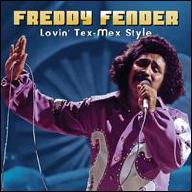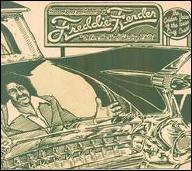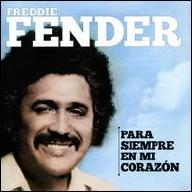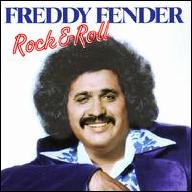While his initial sides were successful with listeners in Texas and Mexico, in 1959 he decided to adopt his stage name, along with a stronger rockabilly feel, in order to attract "gringo" audiences. The following year, he released the self-penned Wasted Days and Wasted Nights, his most successful single yet. But in May of 1960, Fender was convicted of marijuana possession, and was sentenced to five years in Louisiana's notorious Angola State Prison (the same correctional facility which once held blues legend Leadbelly). After serving three years, he was paroled thanks to the efforts of Louisiana governor Jimmie Davis, on the condition that upon Fender's release he stay away from the corruptive influences of the music scene. After his parole ended, Fender tried to re-ignite his career, but with the exception of a few scattered nightclub gigs in the New Orleans area, he found little success, and ultimately returned to San Benito.
In Texas, he spent several years working as an auto mechanic, and even returned to school to pursue a degree in sociology. In 1974, he met Huey P. Meaux, the owner of the Houston-based Crazy Cajun label; after agreeing on a recording deal, it was Meaux who convinced Fender to steer in the direction of country western while maintaining his music's Hispanic roots. After Fender's first Meaux-produced single, Before the Next Teardrop Falls, failed to attract the attention of a major label, it was released on Crazy Cajun; in the first weeks of 1975, the song hit the top of both the country and pop charts, and Fender became an overnight star. For the follow-up, he re-recorded his early single, Wasted Days and Wasted Nights, and notched his second straight number one country hit. Before the year ended, he had released yet another chart-topper in Secret Love, and also issued two LPs, Since I Met You Baby and a self-titled effort.
Throughout the remainder of the '70s, Fender's success continued, most notably with the number two single Living It Down in 1976. That same year, he released two more albums, Your Cheatin' Heart and Rock 'N' Country. In 1977, he also issued a holiday record, Merry Christmas/Feliz Navidad. As the 1980s dawned, however, his popularity began slipping; after his final chart hit, 1983's Chokin' Kind, he focused on an acting career, highlighted by an appearance in the 1988 Robert Redford film #The Milagro Beanfield War. He remained largely silent as a musician until 1990, when he formed the Tex-Mex supergroup Texas Tornados with Doug Sahm, Flaco Jimenez, and Augie Meyers. After three albums, the group disbanded, and Fender again resumed his solo career. ~ Jason Ankeny, Rovi

















